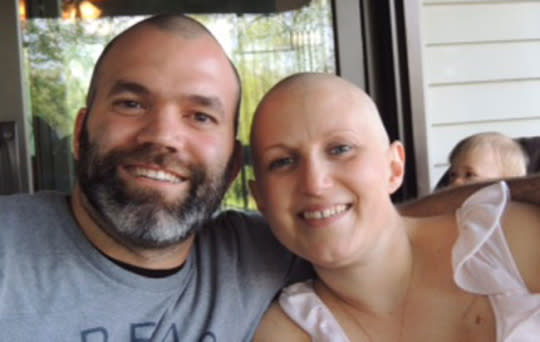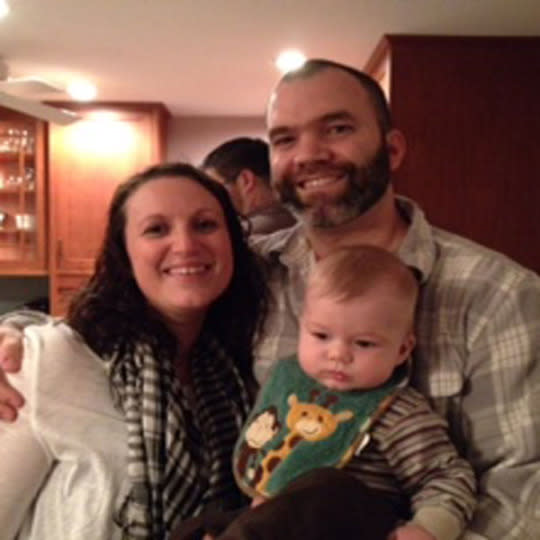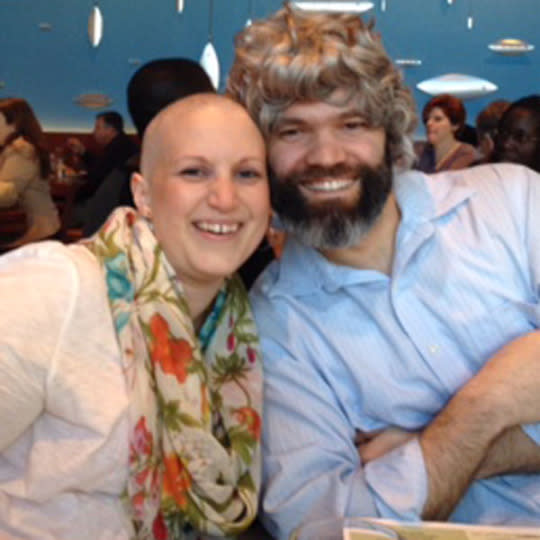How My Cancer Diagnosis Altered My Relationship

“I’d lost my breasts and my hair—how much of a woman was I?” (Photo: Nora Mastrippolito)
At 31, Nora Mastrippolito was diagnosed with stage-two breast cancer. She shares her story with WomensHealthMag.com about what it’s like to try to maintain a relationship while battling a life-threatening illness.
I first noticed something was off with one of my breasts during a regular monthly breast exam. I had just finished breastfeeding my son and wasn’t really concerned at the time.
But when I noticed it again the next month, I asked my husband Phil to feel it, too, since he was the only other person who would know the difference. He wasn’t sure, either, but luckily I was scheduled for a regular doctor’s appointment around this time. My doctor didn’t seem worried, but she sent me to get a mammogram, just in case.
I went to get the mammogram alone since I figured it was no big deal. And when I signed in, the woman at the front desk gave me a heads up that they might also want to do an ultrasound because of my age. Younger women have denser breasts, she explained, so an ultrasound can often tell them more. Sure enough, they requested an ultrasound right after the mammogram. I wasn’t alarmed, though. Since I’ve been told that I have lumpy breasts, I figured it was just a cyst.

After the ultrasound, the technician had me wait while he showed the results to a radiologist. I started to get worried at that point. I had been diagnosed with non-Hodgkin’s lymphoma when I was 12, and I knew that when they ask you to wait, it’s not good.
When the radiologist walked in, I knew instantly that something was wrong. He said, “You need to take a biopsy.” I immediately broke down, and they brought in a nurse navigator, a registered nurse who helps with difficult moments like these. “This kind of news is going to be the hardest,” she said. “But I’ve already done this before,” I said, crying.
The radiologist’s face turned white. It was like an “oh shit” moment—this was something serious. (I later learned that it’s not uncommon for people who have had radiation as a kid to develop cancer later in life. Women especially who have chemo through puberty have a very high risk of developing breast cancer as an adult.)
We scheduled my biopsy for early the next week, and they let me go out the back way because I was crying and blotchy. I really broke down when I got in the car. My first instinct was to think of my kids—they were 6 months and 3 years old at the time.
I called my mom, and she stayed calm. At that point, they hadn’t said it was cancer…but they kind of did. Phil had a similar reaction to my mother’s. I think he was scared but didn’t want to show it. He was a little quiet, and you could tell he was sad.
While I was freaked out, I didn’t want to force Phil to talk about his feelings. Maybe I should have at the time, but…I don’t want to sound selfish, but this was about me. I know he talks with his sister a lot, and I was glad he had that outlet.
The next week, I went in for the biopsy, which confirmed it: I had stage-one nodular carcinoma. Phil came with me to that appointment and every appointment after that.
The oncologist told us that women typically have the option of getting a lumpectomy with radiation, a single mastectomy (to remove just that one breast), or a double mastectomy. But they also did an MRI and found other little polyps in my breast, taking the lumpectomy off the table. I had a little time to think about what I would do, and my mind was on the double mastectomy the whole time. If the radiation that I had as a kid caused a mass on one side, who’s to say it wouldn’t have an effect on the other?
Phil and I talked about it, but it was more my talking about my decision, which I made just after Thanksgiving of last year. I felt like I needed to decide for myself, and he was just always supportive of whatever I wanted to do.
We didn’t have any “what if” conversations at the time—it was more about what was going on at that moment and what was going to be the next step. In retrospect, maybe we should have, but we were focused on making sure the kids would be okay.
My double mastectomy was scheduled for December 19, and I organized things so that someone would always be with me and someone else would be with the kids. Phil is a chef, and it was his busy time of year, so he was going to be working part of the time while I was in the hospital.
But the day after the surgery, Phil showed up. “I couldn’t be at work,” he said. “My mind wasn’t there.”
I was in the hospital for two days, and Phil stayed with me the whole time. We tried as best as we could to keep it light, even though I had four drains in my chest with tubes coming out. The surgery was tough—they removed both breasts and a few lymph nodes from my arm. They also put in spacers so that I could have my breasts reconstructed—but I felt a sense of relief. The cancer was out of me.
Doctors did a full pathology of the mass, which took a week, and what they found made me glad I’d made the decision that I had. The mass was bigger than they thought, which put me into stage-2 cancer. They also found a mass in the other breast, which didn’t show up in scans. It was a lobular carcinoma, which the surgical oncologist told me is a really sneaky form of cancer. The chances are that would have spread faster and gone undetected longer.
Because of the results, I had to have chemo. They got the cancer out, but we did the chemo “just in case.” I wouldn’t start chemo until February, and although he didn’t say it, I could tell Phil was worried. There was just this scary feeling. I didn’t want to press him on how he was dealing and didn’t want to hover. I almost felt comfort knowing that he was talking about things with his sister. That was fine with me.
Right before I was set to start chemo, Phil and I went on a four-day trip to Mexico without the kids for a friend’s wedding. I’m so happy we did that. We had some heavy conversations, and I was still recovering from the surgery, but we tried to keep it light.
When we got back, it was right into chemo. I was nervous because I wasn’t sure how my body would respond. As a kid, I’d lost my hair but didn’t have huge side effects. But I now had kids, so being totally out of it wasn’t an option.

Phil came with me to my first appointment, and while it wasn’t bad, it was draining. Chemo days were always draining. I went every three weeks, and luckily, I didn’t have huge side effects from the chemo itself. There’s a shot they give you, though, that helps to stabilize your white blood count—and it causes the most intense bone pain, to the point where my teeth hurt.
I would have chemo on Monday and a shot on Wednesday, and by Thursday afternoon I was done. I usually did a half-day of work on Thursday and Friday and spend the rest of the day at home, just curled up.
Luckily, Phil was working more day shifts at the time, so he was able to go get the kids, take care of them, make dinner, start the laundry, and do all of the supportive role stuff that I used to do. I didn’t have to ask; he just did it. It just affirmed to me that he was a good guy.
Each chemo builds on itself so, as you go through the cycle, the side effects get more intense. I didn’t have nausea, but I became anemic. When that happens, your energy levels just plummet. By the end, it was really difficult to do anything.
“Phil was working more day shifts at the time, so he was able to go get the kids, take care of them, make dinner, start the laundry, and do all of the supportive role stuff that I used to do.”
Phil’s mom lives down the road and would come over to watch the kids so we could go out and reconnect—that was important to us. But toward the end of chemo, we didn’t go out as much. My taste buds would go with each chemo treatment, and it didn’t make sense to spend money on a meal that I couldn’t taste.
I also started to lose my hair. Phil’s aunt came over to shave my hair off once it started to fall out, which Phil was really supportive of. I actually made him watch her shave it off because I didn’t just want to come home one day with no hair.
It was a little harder to keep that husband-and-wife intimate relationship at that point. After the mastectomy, there was a lot of reconstruction, and I think Phil was scared of hurting me. We weren’t acting the same way we had before because we weren’t being intimate the same way. Plus, I was exhausted all the time.
You definitely have these moments, as positive as you are, where it becomes hard. I’d lost my breasts and my hair—how much of a woman was I? I know they don’t define me or my femininity, but they do make you feel like a woman. I talked to Phil about it a little, but he kept saying things like, “No, you’re beautiful—don’t say that.”
Now, I have one more reconstruction surgery to go, but the big stuff is done. I’m currently in remission, and life is pretty much back to normal—although it only started to feel that way about a month ago.
“I’d lost my breasts and my hair—how much of a woman was I? I know they don’t define me or my femininity, but they make you feel like a woman.”
I know it sounds cheesy, but I think Phil and I came out of this stronger than we were before. Even though I let him emotionally drain on his sister, we’re now better able to say exactly what we feel—and we’re not afraid to tell each other what we need. It was so hard for me to say, “I can’t do this” or “I don’t feel good,” but I’ve learned it’s okay to ask for help—from Phil and from others.
This was definitely a tough road emotionally, and I can see where the financial burden of it would hinder a relationship. My medical bills are enormous. I feel bad about them, but Phil reminds me that it’s our debt, not just mine.

Phil has also switched careers. He worked up to 80 hours a week in his old job as a chef, and now that he’s working in the septic tank industry, he has a more normal schedule. He’d been thinking about making a change for a while, but I think we were both impacted by my illness—it really brings you back to what’s important.
We have so much more time together now, and I’m really happy about that. I think that our relationship will only get better the more normal life becomes, and I can’t wait to see what’s in store for us next.
All photos courtesy of Nora Mastrippolito.
More from Women’s Health:
The Right Way to Share a Deep, Dark Secret with the Person You Love
What It’s Like to Be Engaged to ‘The Man with No Penis’
Is There Really Such a Thing as Getting Married Too Soon?
As Told to Korin Miller
